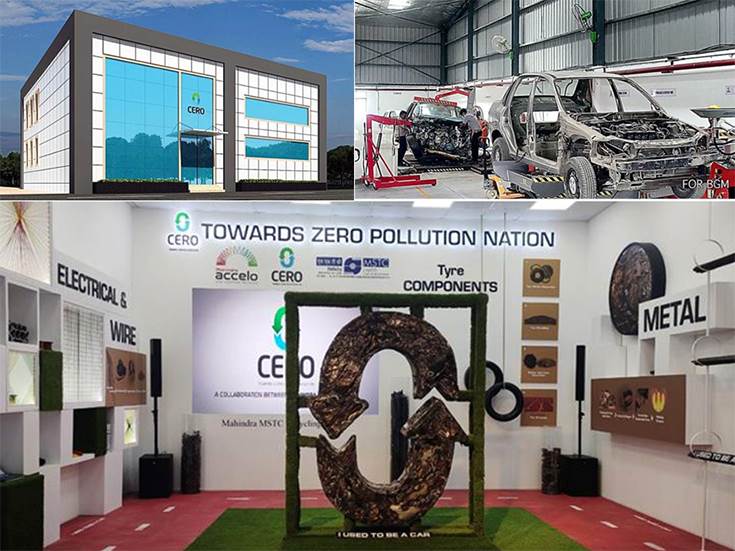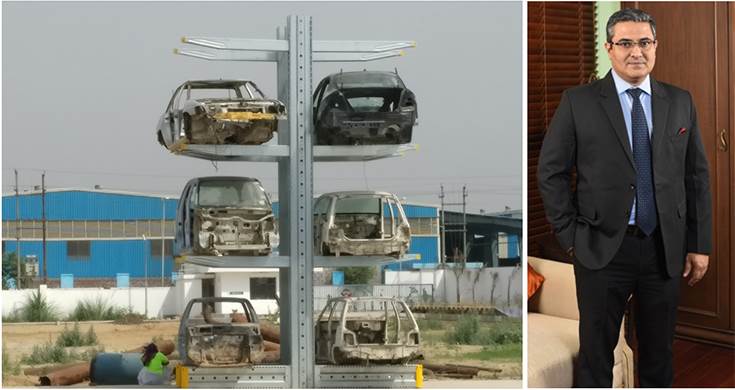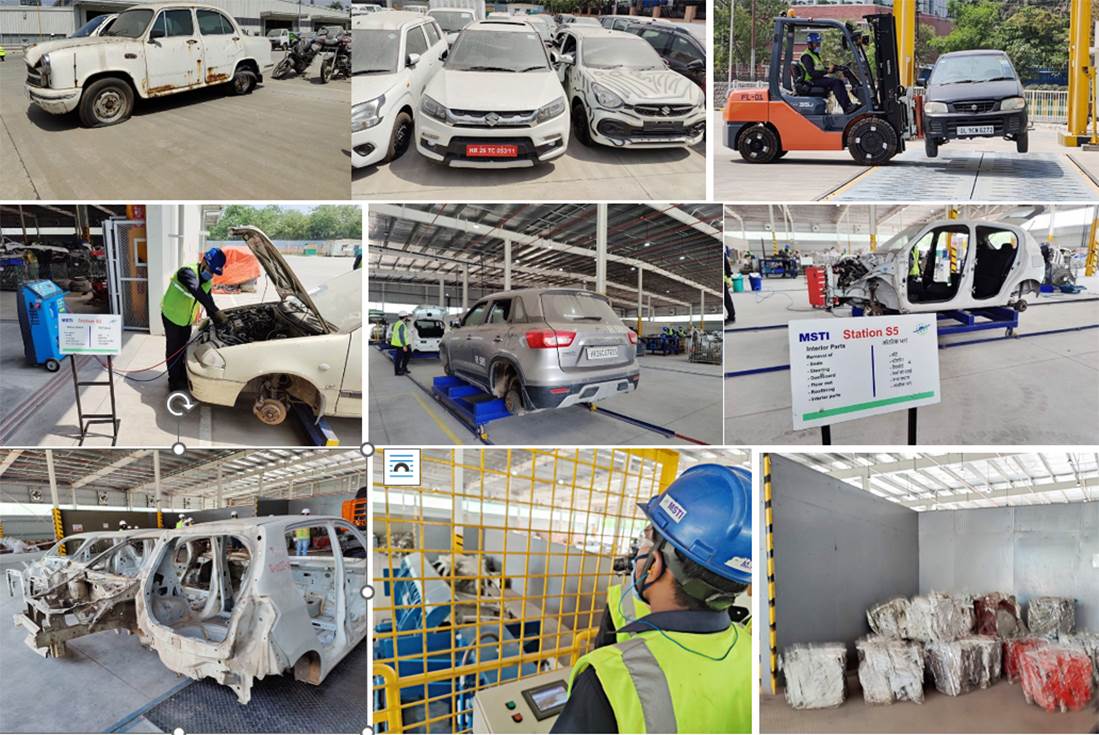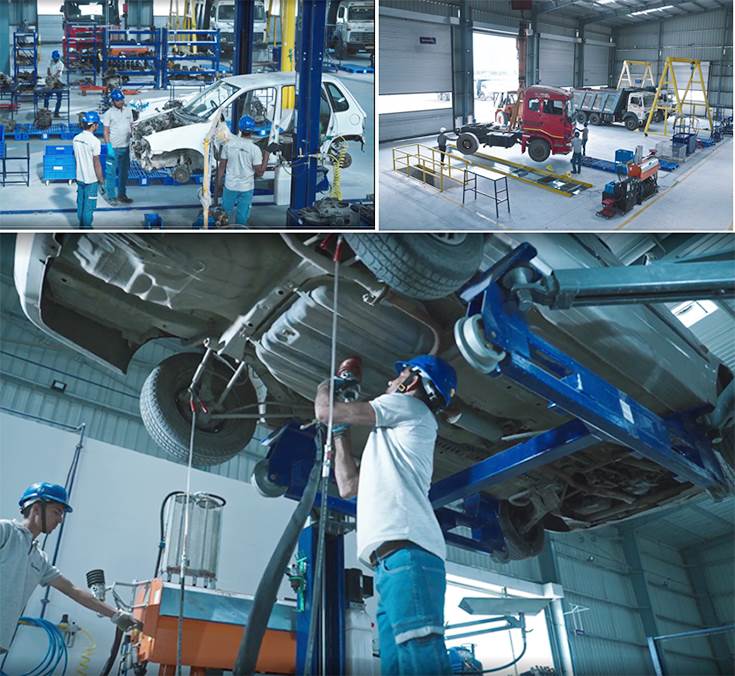Today – March 18 – is Global Recycling Day, one which aims to drive as well as disseminate the message of vitality of the recycling mantra across the world. It is a day to remind corporates, countries and communities to partner to put Planet Earth first and also to change the mindset of governments, industry and people to see recycling and recyclables as a re-energising resource.
According to the International Energy Agency, the global transportation industry is a significant contributor to greenhouse gas emissions and accounts for about 24% of all man-made CO2 emissions. Regulators are addressing this challenge by setting progressive limits on automotive emissions, fuel economy standards or a combination of both. And, what heartening is the global shift to electrified vehicles be they battery EVs (BEVs), plug-in hybrids (PHEVs) or fuel cell EVs (FCEVs).
Another way is vehicle scrappage, which gets rid of old, polluting vehicles on road. Adopted by a number of developed markets, a vehicle scrappage policy is usually mandated by a government to accelerate the replacement of old, polluting vehicles by new vehicles. Such a policy also enables dual gains — stimulating the domestic automobile and automotive industry and importantly, removing inefficient, polluting vehicles from the road, paving the way for greener motoring and cleaner air.
The automotive industry, which has a lot of metal on the road globally, is now going all out to prove its mettle when it comes to recycling end-of-life vehicles. And in India, some companies have taken the lead.
While it’s a nascent field in the country, the demand for scrapping vehicles arises from the government’s Vehicle Scrappage Policy rolled out in August 2021 that mandates all commercial vehicles older than 15 years and passenger vehicles aged more than 20 years to be scrapped if they fail the road-worthiness test.
At present, India has over 51 lakh (5.1 million) light motor vehicles older than 20 years and another 34 lakh which have completed 15 years on the road, and are significantly more polluting than modern-day vehicles that conform to the latest emission regulations. Furthermore, as per a Centre for Science and Environment (CSE) report, India will have a monumental load of over two crore (20 million) unfit ELVs by 2025, causing considerable pollution and environmental damage.
Seized of the need for a greener environment and also viewing recycling as a business opportunity, three of India’s leading carmakers – Mahindra & Mahindra, Tata Motors and Maruti Suzuki India – are upping their green quotient by setting up vehicle scrappage centres in India.
 Mahindra’s CERO to expand presence to 100+ cities by 2025
Mahindra’s CERO to expand presence to 100+ cities by 2025
CERO (Mahindra MSTC Recycling), a joint venture between Mahindra Accelo (a Mahindra Group company) and MSTC (a Government of India enterprise under the Ministry of Steel), is India’s first government-authorised vehicle recycler.
In India, vehicle scrappage continues to be driven by the unorganised sector but change is now underway. Cero drove into the recycling industry in 2018 with an aim to undertake vehicle scrapping in an environmentally manner and with a sharp focus on reducing the carbon footprint using eco-friendly methods of recycling metals from ELVs (end-of-life vehicles). Additionally, there is a focus on customer-friendly practices.
Cero, which essentially means ‘zero’ in Spanish, has zero waste, zero pollution and zero hassles as its target. Its ELV recycling process comprises three key steps:
Quotation: A customer calls up on Cero’s toll-free number 1800 267 6000 or logs in an enquiry on cerorecycling.com and provides the information on the car, the make and model, year of manufacture, condition and location. Cero assesses the information and makes an offer.
Vehicle collection: Pick up date and time are decided as per customer convenience after which a company technician inspects the ELV to confirm its condition. The company subsequently collects the vehicle and transport it to the recycling plant.
Support for deregistration: The Cero legal team will issue the relevant documentation, including a certificate of deposit, to enable the customer to proceed with the deregistration of the recycled vehicle from the relevant R.T.O. This Certificate of Deposit can be utilised by customers for availing benefits on new vehicle purchase, as per policy guidelines provided by Ministry of Road, Transport & Highways which include waiver of registration fee of new vehicle and concession on road tax on new vehicles. Certificate of deposit, can only be provided by government authorized recyclers.
Five years ago, the total vehicle parc of ELVs or more than 15 years old in India was about 28 million. This is expected to reach around 46 million units over the next five years. Steel accounts for around 70% of a car, which on an average is one tonne per car, can be recycled back to the steel industry. That translates into 46 million tonnes of steel in the domestic market by 2028, which is a huge saving for the country which typically imports 6-8 million tonnes of steel scrap each year costing $3-4 billion. Furthermore, a number of other non-steel parts in old cars are also retrieved and recycled for new usage.
CERO, which has a first-mover advantage in the sector having started operations in FY2020, has scrapped close to 15,000 end-of-life vehicles till date. Recognising the growth potential of this industry as well as environmental savings, the company has outlined a strategic future growth roadmap and an aggressive expansion programme. The company, at present, has nine scrappage and recycling plant across India in Noida, Pune, Chennai, Ahmedabad, Indore, Bengaluru, Guwahati, Hyderabad and Chandigarh. These nine plants cater to 36 cities which are in a 300-400km radius, which include major cities like Mumbai, Kolkata, Bhopal, Jaipur, Coimbatore, Nagpur etc.
CERO has a plan to be present in every big city in India and the target for 2025 is more than 100 cities across the country. Every facility will have a vehicle scrappage capacity of about 15,000 units per annum, which can be increased depending upon the lines or modules needed.

CERO is driving home the first-mover advantage in the sector and Sumit Issar, Managing Director, Mahindra Accelo and Director, MMRPL (CERO). who spoke exclusively to Autocar Professional today – Global Recycling Day, is bullish on future growth of the recycling and scrappage industry.
“We aim to recycle up to 95% of the car and once OEMs switch to sustainable materials, the recycling level could go up to as high as 97-98 percent. We are going to bring lot of new technologies in recycling. There are about 46 million ELVs in India, and therefore, the country needs such technologies to recycle precious metals, plastics, battery recycling – moving from lead-acid to lithium-ion batteries. The industry suffers from the challenge of lack of scale at this moment, but future technologies will help recycle these high-value components.”
Issar added, “CERO has been the pioneer in this space and the company has scrappage centres in all key cities where the vehicle parc is substantial. While we are present in nine States across India today, the policy push is not equal in all states and many are still at a very nascent stage. This will still take more time, and somebody will have to take a lead. Therefore, as CERO, we are venturing into new states and plan to foray into 100 cities by 2025, and make people aware about the benefits of vehicle scrappage.”
Given the growing use of plastics in vehicles as OEMs pursue efficiency through lightweighting, he said, “CERO has a recycling solution for steel and we are exploring possibilities to recycle plastics going forward for which the technology already exists globally. “
According to Issar, the company currently scraps and recycles around 300,000 cars a year. Given the growing momentum in the sector, he believes a million units should be possible by 2025-26, depending on the stock coming into its plants. “Economies of scale are going to be very critical and we need to invest into new technologies. Knowing these factors, we are ready for the long run.”
 The Maruti Suzuki Toyotsu India (MSTI) facility in Noida, Uttar Pradesh, can dismantle and scrap up to 24,000 vehicles a year or 2,000 units every month.
The Maruti Suzuki Toyotsu India (MSTI) facility in Noida, Uttar Pradesh, can dismantle and scrap up to 24,000 vehicles a year or 2,000 units every month.
Maruti-Toyota JV can scrap 2,000 ELVs a month
Set up with an investment of Rs 44 crore and commissioned in November 2021, the Maruti Suzuki Toyotsu India (MSTI) vehicle scrapping centre in Noida, Uttar Pradesh, can dismantle and scrap up to 24,000 vehicles annually or 2,000 units every month. MSTI is a JV between Maruti Suzuki and the Toyota Tsusho Group.
At MSTI, a car undergoes an eight-step scrapping process. Vehicle dismantling starts off by performing a radioactive scan and then removing the wheels and emptying the fuel tank. The next step involves trapping the freon gases in the air-conditioning system before the engine and transmission fluids are released and carefully stowed to ensure zero discharge into land or air.
All the doors and body panels are then unmounted at the next station, which is followed by removal of interior trims, including the seats and dashboard. It’s now turn for the wire harnesses to be stripped off, while the engine, transmission and suspension components are removed at the penultimate station.
The last leg involves dismantling of the window and windscreen glasses, vehicle and engine number plates, as well as any miscellaneous parts that might still remain inside the vehicle due to its complexity. In such cases, the team at MSTI first performs a KYT or Kiken-Yochi Training to assess the risks involved in undertaking such a task and charts out an appropriate operating procedure.
The barebones car shell is now ready for being transformed into a steel bale by being compacted in a high-density hydraulic bale press machine that applies pressure of up to 165 bars. While the metal bales are sold to authorised smelters and steel mills, the scrap recovered from the vehicles is sold to authorised recyclers.
Importantly, MSTI offers a customer-friendly recycling route through a doorstep pick-up as well as walk-in services to scrap an ELV. The initial evaluation process adjudges the buyback price, which is based on several parameters including the vehicle size, model, condition, and the type of metals used in its construction. As per the Vehicle Scrappage Policy, the amount is approximately in the range of 4-6% of the ex-showroom price of a new vehicle, and is disbursed directly into the vehicle owner’s bank account.
 On February 28, 2023, Tata Motors opened its first registered vehicle scrapping facility (RVSF) near Jaipur in Rajasthan.
On February 28, 2023, Tata Motors opened its first registered vehicle scrapping facility (RVSF) near Jaipur in Rajasthan.
Tata Motors to set up multiple scrappage centres across India
With an intent to enhance sustainability in the mobility ecosystem, the Tata Group has followed in the footsteps of two of its chief competitors, Mahindra & Mahindra (M&M) and Maruti Suzuki India. While M&M pioneered organised vehicle recycling in India with its Mahindra Cero scrappage centres back in January 2018, Maruti Suzuki India opened its first scrappage centre – Maruti Suzuki Toyotsu India (MSTI) in Noida, Uttar Pradesh in November 2021.
On February 28, 2023, Tata Motors opened its first registered vehicle scrapping facility (RVSF) near Jaipur in Rajasthan. The facility offers vehicle dismantling and scrapping services to passenger and commercial vehicle owners under one roof.
Spread over a 5-acre area alongside the Jaipur-Ajmer highway, the scrappage centre is set up in collaboration with its CV dealership – Ganganagar Vahan Udyog. While the dealership has invested in the setup, the SoP, know-how and training have been imparted by Tata Motors.
With this dealer-franchise model, the company aims to scale up the RVSF count to double digits in FY2024, with new facilities planned to soon come up in Maharashtra, Gujarat, and Chandigarh.
This Tata Motors RVSF can dismantle up to 15,000 vehicles every month including 5,000 heavy commercial vehicles. While there are four stationary bays for CV dismantling, cars go through a six-station line wherein a step-by-step procedure ensures that only the BIW is left by the time it reaches the last station.
When it enters the scrapping unit, a passenger vehicle is first depolluted with all fluids and gases such as the AC refrigerant or CNG, are first eliminated from the car. It then goes through each station to get dismantled in stages, starting with the exterior panels such as doors and hood, before witnessing the windshield, tyres and seats getting removed. While various components are handled differently, with the company tying up with various recyclers for glass, rubber and other components, the empty body shell is sent into a baller to be finally crushed into a ball-sized mass of metal, which is sent to smelters and recyclers.
In case of an HCV, the load-carrying body of the truck is removed from the chassis, which then sees the cabin getting offloaded and dismantled separately. While the drivetrain goes into deep dismantling, the chassis is the one to survive before being sent into the baller.
With its RVSFs, Tata Motors aims to create an ecosystem for phasing out unfit and polluting vehicles, and achieve a lower carbon footprint in the country by replacing them with more fuel-efficient as well as greener vehicles like EVs.
End of life for EVs in India is still some time away. While Mahindra & Mahindra and Tata Motors are already manufacturing electric vehicles (EVs), Maruti Suzuki is slated to do so in a couple of years. EVs and electrified vehicles, while they emit less or no CO2, recycling their batteries is challenging. Lithium-ion batteries are made of critical materials such as cobalt, graphite and lithium which are considered critical minerals. The Roorkee-based Attero Recycling, which claims to be India’s largest electronic waste recycling company, processes over 1,000 tonnes per annum for lithium-ion battery recycling.
Driving towards a greener planet
Automobiles are arguably the most recycled products in the world today. Recycling cars not only helps reduce waste in landfills but also saves precious natural resources. Do you know recycling a single car can save around 2,500kg of iron ore, 1,400kg of coal and 125 tonnes of limestone? Or that more than 25 tonnes of materials are recycled from old or junk vehicles every year worldwide. Recycling old vehicles helps clean the air, makes our roads safer and also reduces India’s dependence on steel scrap imports. It’s time for all to acknowledge the importance of sustainable automotive recycling, in India and the world over.
Even as the foot-tapping ‘Naatu Nattu’ song from the record-breaking Indian film ‘RRR’ has won an Oscar this year, the Indian automotive industry’s and these three leading carmakers’ RRR message of Recycle, Reuse and Repurpose is ringing loud and clear in the world witnessing the severe impact of climate change.
